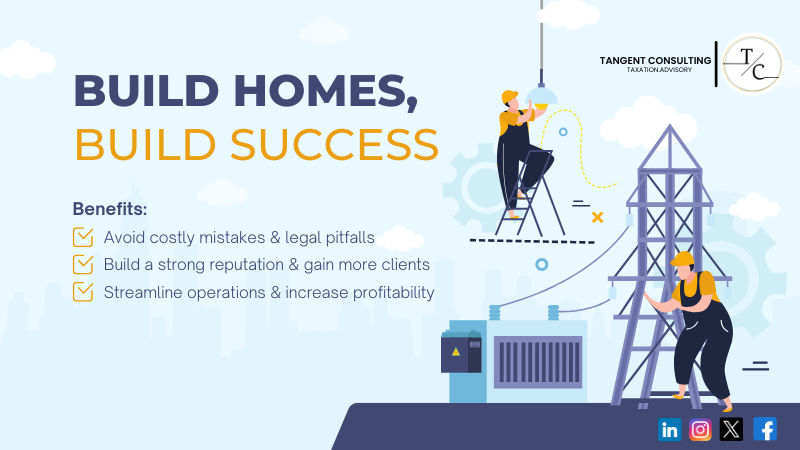How To Start a Home Building Company in 10 Steps
How To Start a Home Building Company in 10 Steps

We had a rushed Monday yesterday. What happened was we snoozed the alarm and couldn’t get up and got late. We skipped breakfast, got stuck in traffic, and couldn’t respond to the emails promptly.
This reminded us that
a. Snoozing alarm isn’t a good idea on Monday
b. A tiny decision can change everything
Speaking of tiny decisions, have you made up your mind about starting a home building business? If you have or don’t know where to start, we have got the perfect guide for you.
In this guide, we’ll break down how to start a home building company in 10 simple steps. So, make sure to stick to the end.

How To Start a Home Building Company?
According to Statista, the residential segment within the construction sector reached above $862 billion in 2023. There’s a clear demand for home-building companies, and with interest rates slowing down, these companies can get their fair share of the pie.
So, let’s see how to start a home-building company:
1. Know Your Market
Before you start, you need to understand the local housing market. What are people looking for? What’s the competition like? Are new developments booming, or is the area oversaturated?
Fortunately, you can get this information from resources like:
- Social Media and Surveys
- Competitor Websites & Reviews
- Industry Events and Reports
You can also use platforms like Zillow, Redfin, and Realtor.com to track local home sales and identify popular styles. Speak with realtors to gain insight into buyer preferences. The more informed you are, the better you can tailor your business to fit market demands.

2. Create a Business Plan
Every successful business starts with a well-thought-out plan, and a home-building company is no exception. Your business plan serves as a roadmap, detailing what you aim to achieve, your target market, and how you plan to hit your goals. A strong business plan should cover the following key elements:
- Company Overview: Define who you are, what makes your business unique, and your core focus. Are you specializing in luxury homes, budget-friendly housing, or large-scale renovations? Clarifying your niche sets the foundation for your brand.
- Business Goals: Outline where you see your company in the next three to five years. Do you want to expand to multiple locations, establish a reputation for high-end craftsmanship, or build a steady client base?
- Products and Services: Specify what you’ll offer—custom home builds, remodeling, additions, or specialized construction services.
- Market Positioning: Identify how your business stacks up against competitors and what unique value you bring to the table.
- Budgeting and Funding: Do you have the capital, or will you need financing?
- Target Market: Who are your ideal clients? Are they first-time homebuyers, luxury market, or commercial developers?
- Operations and Logistics: What’s your supply chain strategy? How will you manage labor?
- Marketing Strategy: How will you get your first clients? (More on that later)

3. Get the Required Documentation
After the business plan, you need to ensure you have all the necessary paperwork in place. A contractor’s license is essential, but keep in mind that most states do not have reciprocal agreements, meaning you’ll need to obtain a separate license for each state you plan to operate in. Additionally, securing a general business license is a must.
If you plan to handle specialized work, such as electrical installations or roofing, be aware that these fields often require additional specialty licenses. Research state and local requirements thoroughly to avoid delays or penalties.
You also need to understand the permits required in your operating area. Different regions have specific rules regarding construction permits, and non-compliance can lead to costly fines or work stoppages. So, it’s important to do your homework.
Depending on your location, you may need:
- A business license
- A contractor’s license
- Liability insurance
- A registered LLC or corporation for tax benefits
- Permits for construction projects
4. Register Your Company
One of the first steps in making your home-building business official is establishing a legal business entity. Even if you’re starting solo, keeping your business separate from your personal finances is crucial.
Many small construction businesses opt for an LLC (Limited Liability Company) because it provides personal asset protection while offering flexibility in operations.
Registering as an LLC helps shield your personal assets from business liabilities, ensuring that any financial or legal issues your business encounters do not impact your personal wealth. Additionally, an LLC structure simplifies tax filing and provides credibility when working with clients and vendors.

5. Break Down Your Financial Goals
A strong financial foundation is essential when starting a home-building business. Begin by assessing your startup costs and determining how much capital you’ll need to launch. If you don’t have the necessary funds on hand, consider options such as securing a business loan or bringing in investors to help cover initial expenses.
Carefully analyze your budget to ensure you have enough financial resources to sustain your business through the early stages. Running out of capital mid-project can be a costly mistake.
6. Build Your Team
Whether you’re managing small projects or large ones, hiring the right people is crucial. In addition to skilled construction workers, you may need administrative support to handle calls, paperwork, and scheduling. You should clearly define roles and responsibilities from the start to ensure efficiency and smooth operations.
Pro Tip: When bringing new hires on board, be upfront about what you can offer. In the early days of your business, you might not have the resources to provide extensive benefits, but setting clear expectations can help attract the right talent.
7. Secure Funding and Manage Cash Flow
Cash flow is king in construction. You need a steady stream of funds to keep all your projects. If you don’t have enough capital, you can explore financing options such as:
- Business loans
- Lines of credit
- Investor funding
- Pre-sale agreements
Also, keep your finances airtight with accounting software like QuickBooks. If you don’t manage cash flow properly, it can create a lot of problems for your business.

8. Build a Strong Network
A home-building business isn’t a one-man show. You need reliable subcontractors, suppliers, realtors, and possibly even investors. The better your network, the more opportunities for your business.
To build a strong network, you can start attending industry events, join local builder associations, and connect with professionals on LinkedIn.
9. Getting the First Client
Many home builders rely solely on referrals, but that’s a risky strategy. You need a strong online presence, starting with:
- A professional website showcasing your projects
- Social media marketing (Instagram & Facebook are great for visual appeal)
- Local SEO to rank for searches like “home builders near me.”
- Partnerships with real estate agents who can refer clients

10. Focus on Quality and Customer Satisfaction
A single bad review can do more damage than you think. Quality and customer satisfaction should be non-negotiable. You should deliver homes that exceed expectations, be transparent in your communication, and handle any issues quickly.
Pros and Cons of Starting a Home Building Company
| Pros | Cons |
| The housing market continuously needs new homes, renovations, and commercial buildings. | The housing industry is sensitive to economic changes. |
| As long as there is a demand for housing, there will be opportunities for home builders. | Requires significant initial investment in equipment, licensing, and labor. |
| Renting or selling developed properties can create long-term revenue streams. | Weather conditions, supply chain issues, and labor shortages can disrupt timelines. |
| The business can grow by expanding into new areas, services, or real estate investments. |

Final Thoughts
Even if you’re eager to hit the ground running, take a step back and think through each stage carefully. Rushing into the business without thorough preparation can lead to costly mistakes.
You need to research the full scope of what’s required like project management, day-to-day operations, and financials.
As we discussed earlier, when starting a business, managing cash flow can be super tricky, and hiring a fractional CFO can be a good option. Fortunately, you don’t have to open another tab to find one.
Tangent Consulting has years of experience as a CFO, business coach, and tax consultant. With us, you don’t need to hire an accountant or business coach separately; you can get both in one place.
P.S. If you are reading this, it means you can have access to our free consultation for your business. Avail this for free today before we change our mind 😉
FAQs
What is the easiest construction business to start?
Handyman services, painting, and small-scale renovations are among the easiest construction businesses to start. They require minimal equipment, licensing, and upfront investment.
How to make a business plan for a construction company?
You need to start with a clear vision, define your target market, and outline your services. Include a financial plan, marketing strategy, and operational roadmap. Keep it detailed yet flexible to adapt to industry changes.
Which construction has the highest profit?
Luxury home building, commercial construction, and specialty trades like electrical or HVAC installations tend to have the highest profit margins due to high demand and premium pricing.
